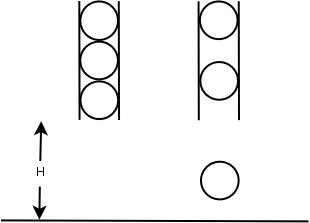Physics Experiment(POJ 3684)
Posted ymir-taomee
tags:
篇首语:本文由小常识网(cha138.com)小编为大家整理,主要介绍了Physics Experiment(POJ 3684)相关的知识,希望对你有一定的参考价值。
- 原题如下:
Physics Experiment
Time Limit: 1000MS Memory Limit: 65536K Total Submissions: 3583 Accepted: 1275 Special Judge Description
Simon is doing a physics experiment with N identical balls with the same radius of R centimeters. Before the experiment, all N balls are fastened within a vertical tube one by one and the lowest point of the lowest ball is H meters above the ground. At beginning of the experiment, (at second 0), the first ball is released and falls down due to the gravity. After that, the balls are released one by one in every second until all balls have been released. When a ball hits the ground, it will bounce back with the same speed as it hits the ground. When two balls hit each other, they with exchange their velocities (both speed and direction).

Simon wants to know where are the N balls after T seconds. Can you help him?
In this problem, you can assume that the gravity is constant: g = 10 m/s2.
Input
The first line of the input contains one integer C (C ≤ 20) indicating the number of test cases. Each of the following lines contains four integers N, H, R, T.
1≤ N ≤ 100.
1≤ H ≤ 10000
1≤ R ≤ 100
1≤ T ≤ 10000Output
For each test case, your program should output N real numbers indicating the height in meters of the lowest point of each ball separated by a single space in a single line. Each number should be rounded to 2 digit after the decimal point.
Sample Input
2 1 10 10 100 2 10 10 100
Sample Output
4.95 4.95 10.20
- 题解:一个球的情形很简单。多个球的情形先考虑R=0,模仿热身题(POJ 1852),在那道题中两只蚂蚁相遇后折返我们将其看作不折返而是擦身而过继续走下去,这里我们就可以无视碰撞,视为直接互相穿过继续运动,由于在有碰撞时,球的相对顺序是不会变得的,所以忽略碰撞,将计算得到的坐标进行排序后,就能直到每个球的最终位置。然后我们再考虑R>0的情形,对于从下方开始的第i个球,在按照R=0计算的结果上加上2Ri就好了。
- 代码:
1 #include <cstdio> 2 #include <cctype> 3 #include <algorithm> 4 #include <cmath> 5 #include <cstring> 6 #define number s-‘0‘ 7 8 using namespace std; 9 10 const int MAX_N=110; 11 const double g=10.0; 12 int K,N,H,R,T; 13 double y[MAX_N]; 14 15 void read(int &x){ 16 char s; 17 x=0; 18 bool flag=0; 19 while(!isdigit(s=getchar())) 20 (s==‘-‘)&&(flag=true); 21 for(x=number;isdigit(s=getchar());x=x*10+number); 22 (flag)&&(x=-x); 23 } 24 25 void write(int x) 26 { 27 if(x<0) 28 { 29 putchar(‘-‘); 30 x=-x; 31 } 32 if(x>9) 33 write(x/10); 34 putchar(x%10+‘0‘); 35 } 36 37 double calc(int); 38 39 int main() 40 { 41 read(K); 42 while (K>0) 43 { 44 read(N);read(H);read(R);read(T); 45 for (int i=0; i<N; i++) 46 { 47 y[i]=calc(T-i); 48 } 49 sort(y,y+N); 50 for (int i=0; i<N; i++) 51 printf("%.2f%c", y[i]+2*R*i/100.0, i+1==N? ‘ ‘: ‘ ‘); 52 K--; 53 } 54 } 55 56 double calc(int T) 57 { 58 if (T<=0) return H; 59 double t=sqrt(2*H/g); 60 int k=(int)(T/t); 61 if (k%2==0) 62 { 63 double d=T-k*t; 64 return H-g*d*d/2; 65 } 66 else 67 { 68 double d=k*t+t-T; 69 return H-g*d*d/2; 70 } 71 }
以上是关于Physics Experiment(POJ 3684)的主要内容,如果未能解决你的问题,请参考以下文章